艾滋病3000字英语作文-fight against AIDS
对抗艾滋病英语作文
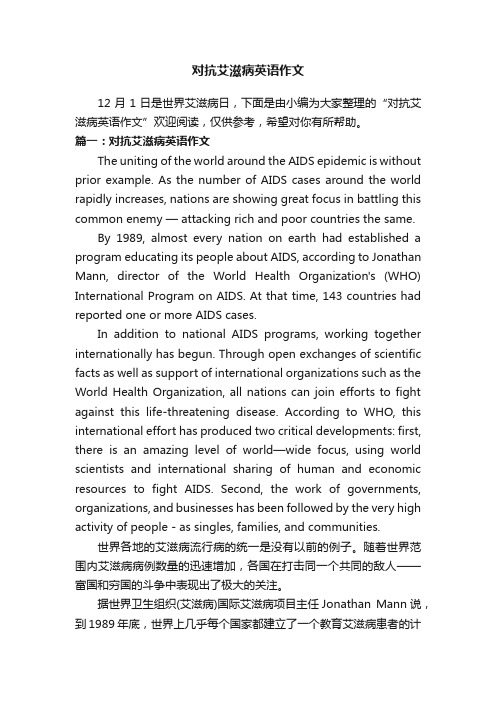
对抗艾滋病英语作文12月1日是世界艾滋病日,下面是由小编为大家整理的“对抗艾滋病英语作文”欢迎阅读,仅供参考,希望对你有所帮助。
篇一:对抗艾滋病英语作文The uniting of the world around the AIDS epidemic is without prior example. As the number of AIDS cases around the world rapidly increases, nations are showing great focus in battling this common enemy — attacking rich and poor countries the same.By 1989, almost every nation on earth had established a program educating its people about AIDS, according to Jonathan Mann, director of the World Health Organization's (WHO) International Program on AIDS. At that time, 143 countries had reported one or more AIDS cases.In addition to national AIDS programs, working together internationally has begun. Through open exchanges of scientific facts as well as support of international organizations such as the World Health Organization, all nations can join efforts to fight against this life-threatening disease. According to WHO, this international effort has produced two critical developments: first, there is an amazing level of world—wide focus, using world scientists and international sharing of human and economic resources to fight AIDS. Second, the work of governments, organizations, and businesses has been followed by the very high activity of people - as singles, families, and communities.世界各地的艾滋病流行病的统一是没有以前的例子。
2022精选预防艾滋病英语作文(通用22篇)

预防艾滋病英语作文2022精选预防艾滋病英语作文(通用22篇)在学习、工作、生活中,大家都写过作文,肯定对各类作文都很熟悉吧,作文是一种言语活动,具有高度的综合性和创造性。
作文的注意事项有许多,你确定会写吗?下面是小编为大家整理的2022精选预防艾滋病英语作文,欢迎阅读,希望大家能够喜欢。
预防艾滋病英语作文篇1AIDS is terrible, but we should take out the compassion, to clsoe the AIDS people, believe the disease will succumb, because we have a red ribbon, because we believe that their own true feelings in the world in...What he had AIDS the terrible is that: people infected with HIV/AIDS, however, the whole body of the defense system is damaged, and his body back to a lot of herpes. After losing the immune function, HIV will creep in, but also will be transmitted to offspring through genetic; AIDS patients because of a little cold and fever are likely to take their lives according to the statistics, the number of people with HIV/AIDS in China has been up to more than 70 70 people, has become the most one of the three diseases threatening people's life in China.Each year on December 1, are as the prevention of AIDS day, the United Nations health organization mission is "stop AIDS, to fulfill the promise." Ways to transmit HIV mother-to-child transmission (PMTCT) and blood are the main types of the way. Normal person as long as there is too with HIV/AIDS patients and the intimate contact, normal contacts are not infected.Some people despise the AIDS people, look down upon them, and they felt very self-abased, it is virtually killing their dignity and rights, let them try their best to, to go through someextreme means to revenge the "dark" to the society! Some AIDS people even conceived the notion of death, to die this way to leave this sad and lost the sad place. In order to their precious life, we should be a kindness, seeking nothing in return, to take care of them, let them feel the warmth of the society, let them free, high life! We take care of them, to encourage them with love. We should actively and they pull the hand, make friends and help them out of the lost, let they bathed in love sunshine, under the same blue sky, life with us!Out of love, with the AIDS patients! Out of love, to the world, let the world is full of love!艾滋病固然可怕,但我们应该拿出爱心,去关艾滋病人,相信病魔一定会有所屈服的,因为我们有红丝带,因为我们相信人间自有真情在……艾滋病的可怕之处便在于此:人一但感染上艾滋病,全身的防御系统即被破坏,全身回出现大量的疱疹;人的免疫功能丧失后,艾滋病毒就会乘虚而入,而且还会通过遗传来传染给后代;艾滋病患者就因为一次小小的感冒和发烧就有可能夺去他们的生命据统计,我国患有艾滋病的人数已经高达70余万人,已经成为最威胁我国人民生命的三大疾病之一。
防艾滋英语小作文

防艾滋英语小作文Title: Combating HIV/AIDS: A Call to Action。
HIV/AIDS continues to be a significant global health challenge, affecting millions of lives worldwide. As we stand at the forefront of the battle against this pandemic, it is imperative to employ effective strategies for prevention and control. In this essay, we will explore key measures to combat HIV/AIDS and promote awareness in English-speaking communities.First and foremost, education plays a pivotal role in prevention efforts. By imparting knowledge about HIV transmission, prevention methods, and stigma reduction, we empower individuals to make informed decisions about their sexual health. Comprehensive sex education programs in schools and community outreach initiatives can equip people with the necessary tools to protect themselves and others from HIV infection.Moreover, access to testing and treatment services is essential for controlling the spread of HIV/AIDS. Regular HIV testing allows for early detection and timely intervention, leading to improved health outcomes and reduced transmission rates. It is imperative to maketesting services readily available and culturally sensitive to encourage widespread uptake, especially among marginalized populations who may face barriers to accessing healthcare.Furthermore, promoting condom use and safe injecting practices is crucial in reducing the risk of HIV transmission. Condom distribution programs and harm reduction services can help mitigate the spread of thevirus among vulnerable populations, such as sex workers, people who inject drugs, and men who have sex with men. By advocating for safer sexual practices and providing access to protective measures, we can significantly reduce the incidence of new HIV infections.In addition to individual-level interventions, community engagement and advocacy efforts are vital foraddressing the social determinants of HIV/AIDS. Discrimination, stigma, and human rights violations continue to hinder HIV prevention and treatment efforts, particularly among key populations. By fostering inclusive and supportive environments, we can challengediscriminatory attitudes and ensure that all individuals have access to the resources they need to stay healthy and protected.Furthermore, leveraging technology and innovation can enhance HIV/AIDS prevention and care services. Mobile health (mHealth) interventions, telemedicine platforms, and digital outreach campaigns can reach remote and underserved communities, providing them with vital information and support. Additionally, research into new biomedical interventions, such as pre-exposure prophylaxis (PrEP) and HIV vaccines, holds promise for further reducing the burden of HIV/AIDS globally.In conclusion, combating HIV/AIDS requires a multifaceted approach that addresses the complex interplay of biological, social, and structural factors. Byprioritizing education, testing, treatment, and community empowerment, we can make significant strides towards ending the HIV/AIDS pandemic and creating a world free of stigma and discrimination. Together, let us unite in our efforts to build a healthier and more equitable future for all.。
描写预防艾滋病的英语作文
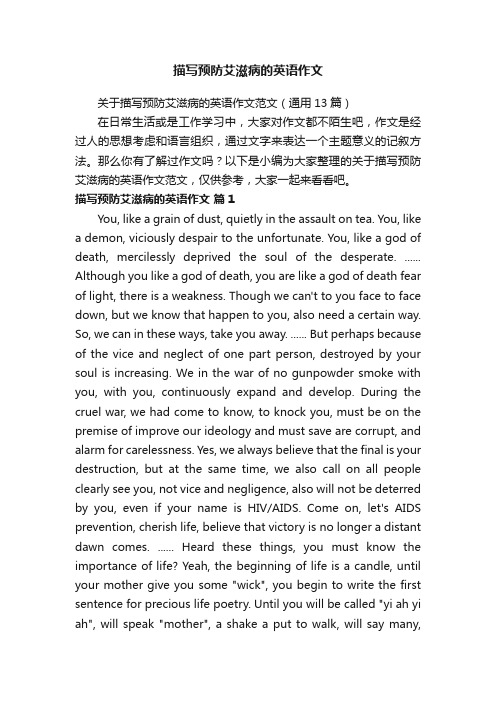
描写预防艾滋病的英语作文关于描写预防艾滋病的英语作文范文(通用13篇)在日常生活或是工作学习中,大家对作文都不陌生吧,作文是经过人的思想考虑和语言组织,通过文字来表达一个主题意义的记叙方法。
那么你有了解过作文吗?以下是小编为大家整理的关于描写预防艾滋病的英语作文范文,仅供参考,大家一起来看看吧。
描写预防艾滋病的英语作文篇1You, like a grain of dust, quietly in the assault on tea. You, like a demon, viciously despair to the unfortunate. You, like a god of death, mercilessly deprived the soul of the desperate. ...... Although you like a god of death, you are like a god of death fear of light, there is a weakness. Though we can't to you face to face down, but we know that happen to you, also need a certain way. So, we can in these ways, take you away. ...... But perhaps because of the vice and neglect of one part person, destroyed by your soul is increasing. We in the war of no gunpowder smoke with you, with you, continuously expand and develop. During the cruel war, we had come to know, to knock you, must be on the premise of improve our ideology and must save are corrupt, and alarm for carelessness. Yes, we always believe that the final is your destruction, but at the same time, we also call on all people clearly see you, not vice and negligence, also will not be deterred by you, even if your name is HIV/AIDS. Come on, let's AIDS prevention, cherish life, believe that victory is no longer a distant dawn comes. ...... Heard these things, you must know the importance of life? Yeah, the beginning of life is a candle, until your mother give you some "wick", you begin to write the first sentence for precious life poetry. Until you will be called "yi ah yi ah", will speak "mother", a shake a put to walk, will say many,many words, have thought, will feel everything is so beautiful. Till now, did you know if our lives of AIDS, just never see butterflies dance track and spring like washed the sky this truth? If you out the candle, that you see will be darkness, not light. ...... In order to not let us lose precious life much earlier, from now on, please look around the size of the details. The classmates! Please drive your mom and dad, relatives and friends, let everybody pay attention to personal hygiene, AIDS is not with us! Let us shout loudly: "AIDS prevention! Cherish precious life!"你,如同一粒尘土,悄悄地侵临在不幸者的身上。
艾滋病英语作文:fightagainsthiv

艾滋病英语作文:fight against hiv艾滋病英语作文:fight against hiv在我们平凡的.日常里,大家一定都接触过作文吧,作文根据写作时限的不同可以分为限时作文和非限时作文。
怎么写作文才能避免踩雷呢?下面是小编帮大家整理的艾滋病英语作文:fight against hiv,希望能够帮助到大家。
first observed in 1988, world aids day this year has a worldwide theme of "universal access and human rights: i am", reminding people that hiv has not gone away, and that there are many things still to be done for everyone. according to the latest report on aids by unaids and world health organization, there are now 33.4 million people living with hiv, including 2.1 million children.dr. anthony fauci, director of the national institute of allergy and infectious diseases at the national institutes of health of the united states, says the us government has injected huge investment in hiv research, which has yielded progress over the years.dr. fauci says while treatment is crucial, prevention should be prioritized in the first place to reduce infection."finally, in prevention, there are a number of proven prevention strategies that we know work. everything from counseling and media campaigns to distribution of condoms, needle exchange programs, circumcision, prevention of mother-to-child transmission. again, that's the good news. the sobering news is that globally, less than 20 percent of people who would benefit from prevention modalities actually have access to them. "michele moloney-kitts, assistant united states global aidscoordinator in the office of the u.s. global aids coordinator, says in the global context, the us is the largest donor by far to the global fight against aids.。
预防艾滋病,人人有责英语作文

预防艾滋病,人人有责英语作文预防艾滋病,人人有责英语作文(通用20篇)在日常学习、工作和生活中,大家都经常接触到作文吧,根据写作命题的特点,作文可以分为命题作文和非命题作文。
怎么写作文才能避免踩雷呢?以下是小编整理的预防艾滋病,人人有责英语作文(通用20篇),欢迎大家借鉴与参考,希望对大家有所帮助。
预防艾滋病,人人有责英语作文篇1God is fair, in closed a door to others at the same time, will also give them open from ordinary people can't touch, touch the other door.Lucky people, AIDS is dashed like normal family life, but they have received a most precious gift: help."Broken flowers," please don't cry, don't be sad and lifted up, starting looking at the sky and we walked hand in hand to belong to our happiness.You be permeated with the youth and vitality, with rain and dew to welcome handsome sunglow, we will be with you all the way of mutual ban on HIV/AIDS, for mutual goal go all the way, "defeat HIV".If I really have a opportunities for the heat to the HIV/AIDS patients, it is my happiest day.I want to dance with them; I want to and they sing; I will shake hands with them; I will hug with them. To give them emotional support, to give them psychological resolution faith, said to them: "AIDS is not terrible, but resolution that belief is exotic to overcome it." When I see a happy smile on their faces when open, I will feel very happy, because I gave them happy.As long as the home of the eve of the give a little love, the country will be better in the world, is ah! Virus without lovers love,care for AIDS patients, let they no longer feel the cold, clear normal gap with them, let them have enough courage to face the future, to overcome the demons.So, I call to arms, the whole society should care and help these patients, accompany them through the lowest life itself, looking for the dazzling sun, find themselves the blue sky! Let us together to build beautiful home! Believe that the future of the country will be more handsome and charming, so the congress in the future much more glorious!上帝是公正的,在向别人封闭一扇门的同时,还会给他们从头打开常人所无法感触到、触摸到的另一扇门。
有关艾滋病英语作文五篇1

有关艾滋病英语作文五篇世界卫生组织于1988年1月将每年的12月1日定为世界艾滋病日,号召世界各国和国际组织在这一天举办相关活动,宣传和普及预防艾滋病的知识。
欢迎大家参阅!英语作文艾滋病作文1World AIDS Day, observed December 1 each year, is dedicated to raising awareness of the AIDS pandemic caused by the spread of HIV infection. It is common to hold memorials to honor persons who have died from HIV/AIDS on this day.Government and health officials also observe the event, often with speeches or forums on the AIDS topics. Since 1995, the President of the United States has made an official proclamation on World AIDS Day. Governments of other nations have followed suit and issued similar announcements。
AIDS has killed more than 25 million people between 1981 and 20xx, and an estimated 33.2 million people worldwide live with HIV as of 20xx, making it one of the most destructive epidemics in recordedhistory. Despite recent, improved access to antiretroviral treatment and care in many regions of the world, the AIDS epidemic claimed an estimated 2 million lives in 20xx, of which about 270,000 were children。
与艾滋病作战的英语作文

三一文库()〔与艾滋病作战的英语作文〕The World AIDS Day is confronted with a gloomy picture that shows the deadly virus is not abating, but spreading even faster.Deaths and new cases of infection have reached unprecedented highs in 2003 and are likely to rise still further, according to a report jointly released last week by the United Nations and the World Health Organization (WHO).This year, some 5 million people have been infected, bringing the total number of people living withHIV/AIDS to 40 million worldwide. At the same time, some 3 million died of the disease.The epidemic continues to expand, far from reaching a plateau, health experts warn.While Sub-Saharan Africa remains the worst affected region, the Asia-Pacific area - home to 60 per cent of the world's population - is shaping up as the new battleground in the fight against the disease,the report indicates.Unless effective action is taken, some countries in the region may face major epidemics.China may become one of them should the country not be responsive to the crisis.Latest statistics put the number of people with HIV/AIDS in China at 840,000, including 80,000 AIDS patients.Worse, the momentum for further spreading of the numbers is continuing, and may well be accelerating.Though the current prevalence in the country is still low, the increased infection rate plus the vast population in the nation points to a possible catastrophic explosion in cases in the absence of stepped up efforts to fight the disease.Chinese AIDS experts have raised the alarm that people living with HIV/AIDS may soon soar to 10 million by 2010 without efficient prevention methods. While the number could be trimmed down to 3 million if prevention methods work, action, and only action, can make the difference.Due to ignorance and lack of commitment among some,the disease has already caused great human suffering, economic losses and social devastation. Yet waiting ahead could be losses multiplied exponentially if the virus is not kept at bay.The situation is grave, and the challenge is tough. China cannot afford a delay in making a serious commitment to the fight and taking action.Initiatives have indeed been rolled out, and they must be followed.Executive Health Vice-Minister Gao Qiang recently pledged that the government will provide free medical treatment to HIV carriers and AIDS patients in rural areas or those among the urban poor. He promised to ensure legal rights and interests of HIV/AIDS victims.He said that local governments will be held directly accountable if loopholes in their work lead to serious epidemics in their regions. He also called for intensified government intervention into behaviour found to be at risk.This is viewed as the strongest commitment to date by the government in tackling the epidemic.The plan, if carried out well, will surely be a。
反对艾滋病歧视英语作文
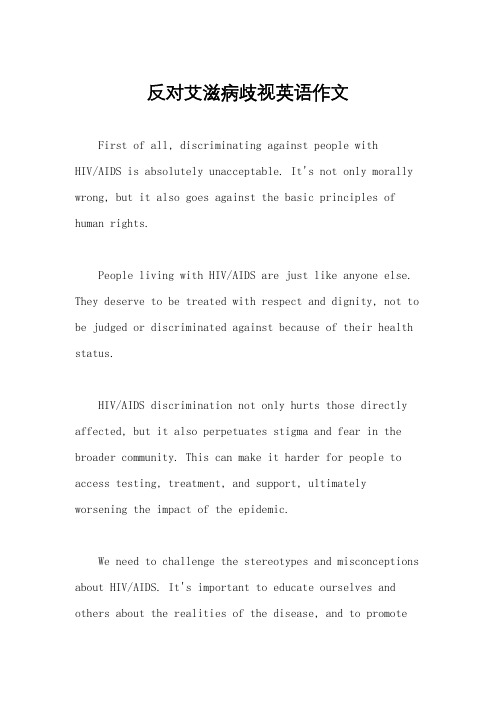
反对艾滋病歧视英语作文First of all, discriminating against people withHIV/AIDS is absolutely unacceptable. It's not only morally wrong, but it also goes against the basic principles of human rights.People living with HIV/AIDS are just like anyone else. They deserve to be treated with respect and dignity, not to be judged or discriminated against because of their health status.HIV/AIDS discrimination not only hurts those directly affected, but it also perpetuates stigma and fear in the broader community. This can make it harder for people to access testing, treatment, and support, ultimately worsening the impact of the epidemic.We need to challenge the stereotypes and misconceptions about HIV/AIDS. It's important to educate ourselves and others about the realities of the disease, and to promoteunderstanding and empathy for those living with it.We must work towards creating a more inclusive and supportive society for people with HIV/AIDS. This means advocating for policies and laws that protect their rights and ensure equal access to healthcare and other services.In conclusion, we must stand up against HIV/AIDS discrimination in all its forms. It's time to show compassion and solidarity towards those affected, and to work towards a world where everyone is treated with dignity and respect, regardless of their HIV status.。
艾滋病英语作文(优秀8篇)

艾滋病英语作文(优秀8篇)艾滋病的作文篇一艾滋病,这位人类的“生命杀手”如同一粒尘土,悄悄地降临在不幸者的身上,如同一个恶魔,凶恶地使不幸者悲痛绝望;如同一位死神无情地剥夺了绝望者的灵魂……。
艾滋病是一种有艾滋病毒,即人类免疫缺陷病毒入侵人体后破坏人体免疫功能,使人体发生多种不可治愈的感染和肿瘤,最后导致被感染死亡的一种严重传染病。
从它降临人类的那一天开始,它惊醒了沉睡中的我们,使我们认识了艾滋,了解了艾滋,惧怕了艾滋,远离了艾滋病人。
中国每14秒便增加一名艾滋病患者,世界每天新增1.4万人,按照这个飞奔般的速度发展,人类将被这个可怕的“生命杀手”赶尽杀绝。
那么我们应该怎么办呢?我们都知道,艾滋病是靠性传播、母婴传播和血液传播的,它威胁着每个人和每个家庭。
因此,预防艾滋病是全人类的责任。
我们中学生更应该从以下几点做起:1、洁身自爱,遵守性道德是预防性传播传染艾滋病的根本措施。
所以我们中学生要从自己做起,懂得自尊自爱,不去做那些不该做的事,把心思都集中在学习上,不去看那些色情的东西,控制自己的情感,真正把精力放在学习上,争取更大的进步,才能使自己不堕落。
这样就能迈出了预防艾滋病的第一步。
2、远离毒品。
避免共享针头,禁止吸毒,减少血液接触。
处理伤口时,一定要注意避免皮肤、眼睛、口腔接触到别人的血液。
这样就为远离艾滋病迈出了第二步。
3、防止交叉传染。
避免不必要的输血、注射;严禁使用没有严格消毒的不安全拔牙和打耳洞等。
4、注意个人卫生,集体卫生,不共用别人的东西,时时注意保护自己的身体健康。
我认为只要我们从以上四个方面做起,相信我们就肯定能把艾滋病挡在健康的大门外。
同学们,请让我们的生命之花永远都开放着吧,让我们的生命蜡烛永远都亮着吧。
因为如果生命的蜡烛熄灭了,我们看到的将是黑暗而不是光明。
……为了不让我们的生命烛光更早的熄灭,同学们!从现在开始,请你注意身边的大小细节,请你带动你们的爸爸妈妈,亲戚朋友,大家一起注意个人的卫生,让艾滋病不与我们同在吧!最后,让我们一起大声地喊出“珍爱生命,远离艾滋病”吧!艾滋病的作文篇二无情的岁月风蚀了阿嫂所有缤纷的梦想,踏上无边的人生道路,她经历了艰难困苦,本想给儿子娶个漂亮媳妇。
艾滋病英语作文:预防艾滋病(fight aids)

艾滋病英语作文:预防艾滋病(fight aids)by official estimates, china has 840,000 people carrying hiv, the virus that causes aids, and about 80,000 aids patients.despite the fairly large groups of hiv carriers and aids patients, the epidemic is mostly confined to high-risk groups, such as drug users, prostitutes and users of blood products. and it has yet to spread widely in the rest of the nation.the chinese government is well aware of such perspectives, and the central and local governments have allocated 6.8 billion yuan (us$822 billion) to establish and improve disease prevention and control mechanisms in provinces. each year a special fund of more than 200 million yuan (us$24 million) is channeled into hiv/aids prevention, care and treatment.since april, free medicine to poor aids patients has been delivered in regions hit hardest by the virus.just as the impacts of aids reaches social and economic fields of society, effective prevention also requires united efforts from virtually all sectors.key factors needed include public education, affordabledrugs, medical training for healthcare workers in hospitals and the public health system, monitoring and evaluation, care for orphans, measures to stop mother-to-child transmission, a comprehensive care framework and research into vaccines and a cure.none of these things can be achieved with the single hand of any institution not health officials, not medical workers or the government.the fight against hiv/aids requires the participation of as many parties as possible.。
Fighting AIDS(与艾滋病斗争)
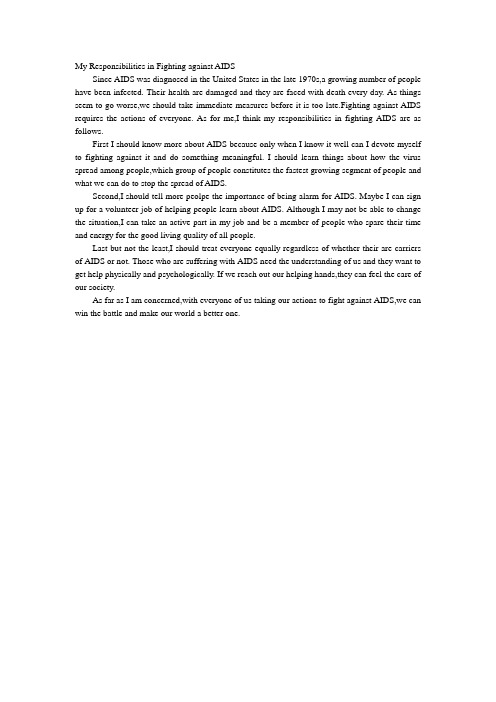
My Responsibilities in Fighting against AIDSSince AIDS was diagnosed in the United States in the late 1970s,a growing number of people have been infected. Their health are damaged and they are faced with death every day. As things seem to go worse,we should take immediate measures before it is too late.Fighting against AIDS requires the actions of everyone. As for me,I think my responsibilities in fighting AIDS are as follows.First I should know more about AIDS because only when I know it well can I devote myself to fighting against it and do something meaningful. I should learn things about how the virus spread among people,which group of people constitutes the fastest growing segment of people and what we can do to stop the spread of AIDS.Second,I should tell more peolpe the importance of being alarm for AIDS. Maybe I can sign up for a volunteer job of helping people learn about AIDS. Although I may not be able to change the situation,I can take an active part in my job and be a member of people who spare their time and energy for the good living quality of all people.Last but not the least,I should treat everyone equally regardless of whether their are carriers of AIDS or not. Those who are suffering with AIDS need the understanding of us and they want to get help physically and psychologically. If we reach out our helping hands,they can feel the care of our society.As far as I am concerned,with everyone of us taking our actions to fight against AIDS,we can win the battle and make our world a better one.。
艾滋病3000字英语作文 fight against AIDS
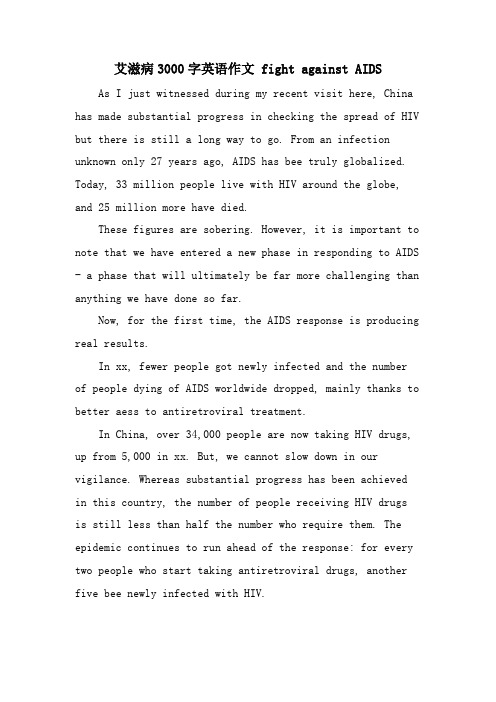
艾滋病3000字英语作文 fight against AIDS As I just witnessed during my recent visit here, China has made substantial progress in checking the spread of HIV but there is still a long way to go. From an infection unknown only 27 years ago, AIDS has bee truly globalized. Today, 33 million people live with HIV around the globe, and 25 million more have died.These figures are sobering. However, it is important to note that we have entered a new phase in responding to AIDS - a phase that will ultimately be far more challenging than anything we have done so far.Now, for the first time, the AIDS response is producing real results.In xx, fewer people got newly infected and the number of people dying of AIDS worldwide dropped, mainly thanks to better aess to antiretroviral treatment.In China, over 34,000 people are now taking HIV drugs, up from 5,000 in xx. But, we cannot slow down in our vigilance. Whereas substantial progress has been achievedin this country, the number of people receiving HIV drugsis still less than half the number who require them. The epidemic continues to run ahead of the response: for every two people who start taking antiretroviral drugs, another five bee newly infected with HIV.Many of those infections our in situations that are illegal or outside of mainstream society. These give rise to apparent contradictions between respect for the law and protecting the health of people who inject drugs or are sex workers, between sexuality and morality, between needs of public security and public health, drug control and safe injections. Indeed, to confront AIDS is to confront contradictions in society.On closer investigation, however, most of these contradictions prove to be false contradictions. A scientifically-based AIDS response can solve them for the greater wellbeing of more people.Drug abuse, for example, is bad for an individual's health and for the munity he or she lives in. HIVinfections are particularly high among people who inject drugs. Laws against drugs must be respected to protect society.Ultimately, though, the best way to protect both the wider population and drug users, and at the same time reconcile public security and public health concerns is to adopt the "harm reduction" approach. Scientific evidence - including here in China- shows that providing drug users with substitution therapy and clean needles reduces HIV transmission and supports enforcement of laws against drug abuse.Similarly, working with sex workers and their clients to encourage condom use reduces HIV among these groups and in society as a whole. When such programs are backed up by poverty reduction efforts to reduce women's need to engage in prostitution, their impact is even greater.It is issues such as these that make AIDS such a plex problem to deal with. Complex problems require plex solutions. They also respond best to collective approaches. Working with munity groups, for example, can greatly increase the impact - and effectiveness - of AIDS strategies. In fact, given that most infections are happening in situations outside the mainstream norm, it is often very difficult for government alone to reach those who need to be reached.It is encouraging, therefore, to note that there has recently been an increase in the number of munity organizations working on AIDS in China. Many of these groups are doing incredible work.The Joint Assessment Report published last year by the government together with the United Nations System clearly highlights the need for greater involvement of munity-based organization in the roll-out of programs to reach people with relevant services.Currently, there are no easy ways for munity-based organizations to register. Without registration, there canbe no bank aount and thus no easy way to receive funding. Many of the groups I have seen are doing a great job - but their work is based on volunteerism. This is neither efficient nor sustainable.China has solid policies in place and has made significant progress in the fight against AIDS. It is time now to use the tremendous array of resources at its disposal to build on that progress, and to tackle new, tough challenges like harm reduction and increasing civil society involvement,As Chairman Mao said more than 60 years ago: "We must not bee placent over our suess. We should check our placency and constantly criticize our shortings, just as we should wash our faces and sweep the floor every day to remove the dirt and keep them clean."。
关于艾滋病的英语作文
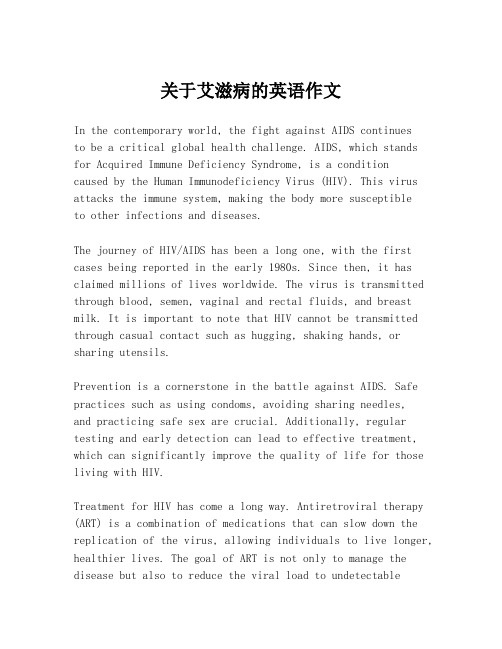
关于艾滋病的英语作文In the contemporary world, the fight against AIDS continuesto be a critical global health challenge. AIDS, which stands for Acquired Immune Deficiency Syndrome, is a conditioncaused by the Human Immunodeficiency Virus (HIV). This virus attacks the immune system, making the body more susceptibleto other infections and diseases.The journey of HIV/AIDS has been a long one, with the first cases being reported in the early 1980s. Since then, it has claimed millions of lives worldwide. The virus is transmitted through blood, semen, vaginal and rectal fluids, and breast milk. It is important to note that HIV cannot be transmitted through casual contact such as hugging, shaking hands, or sharing utensils.Prevention is a cornerstone in the battle against AIDS. Safe practices such as using condoms, avoiding sharing needles,and practicing safe sex are crucial. Additionally, regular testing and early detection can lead to effective treatment, which can significantly improve the quality of life for those living with HIV.Treatment for HIV has come a long way. Antiretroviral therapy (ART) is a combination of medications that can slow down the replication of the virus, allowing individuals to live longer, healthier lives. The goal of ART is not only to manage the disease but also to reduce the viral load to undetectablelevels, which can prevent the spread of the virus to others.Education plays a vital role in combating the stigma associated with HIV/AIDS. Many people still harbor misconceptions and prejudices about the disease, which can lead to discrimination and isolation of those affected. By educating communities about the facts of HIV transmission, prevention, and treatment, we can foster understanding and compassion.The global community has made significant strides in thefight against AIDS. Organizations like the Joint United Nations Programme on HIV/AIDS (UNAIDS) work tirelessly to coordinate international efforts to combat the disease. There have been remarkable achievements, such as the increase in access to treatment and the reduction in new infections in many parts of the world.However, challenges remain. In some regions, access totesting and treatment is limited due to economic constraints, lack of infrastructure, and social barriers. Moreover, the emergence of drug-resistant strains of HIV poses a new threat to the progress made so far.In conclusion, AIDS is a complex health issue that requires a multifaceted approach. It is a disease that touches every corner of the globe and affects individuals of all walks of life. By working together—through education, prevention, treatment, and support—we can continue to make strides towards an AIDS-free generation. It is a collective effortthat requires the commitment of governments, healthcare providers, communities, and individuals alike.。
艾滋病英语作文:Fighting against AIDS_3000字.docx
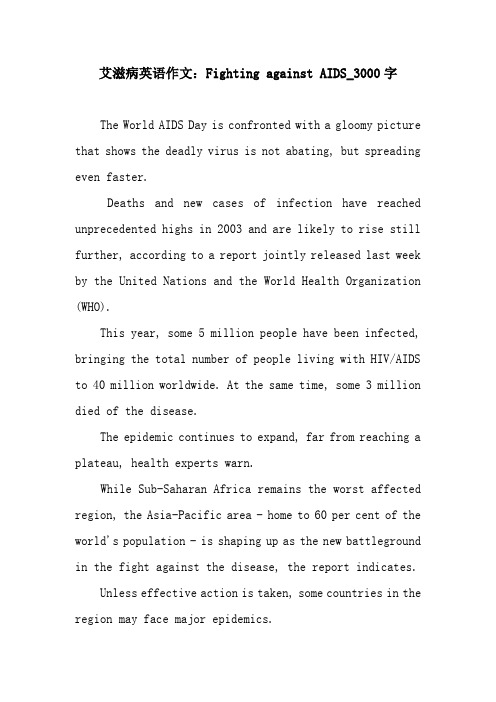
艾滋病英语作文:Fighting against AIDS_3000字The World AIDS Day is confronted with a gloomy picture that shows the deadly virus is not abating, but spreading even faster.Deaths and new cases of infection have reached unprecedented highs in 2003 and are likely to rise still further, according to a report jointly released last week by the United Nations and the World Health Organization (WHO).This year, some 5 million people have been infected, bringing the total number of people living with HIV/AIDS to 40 million worldwide. At the same time, some 3 million died of the disease.The epidemic continues to expand, far from reaching a plateau, health experts warn.While Sub-Saharan Africa remains the worst affected region, the Asia-Pacific area - home to 60 per cent of the world's population - is shaping up as the new battleground in the fight against the disease, the report indicates.Unless effective action is taken, some countries in the region may face major epidemics.China may become one of them should the country not be responsive to the crisis.Latest statistics put the number of people with HIV/AIDS in China at 840,000, including 80,000 AIDS patients.Worse, the momentum for further spreading of the numbers is continuing, and may well be accelerating.Though the current prevalence in the country is still low, the increased infection rate plus the vast population in the nation points to a possible catastrophic explosion in cases in the absence of stepped up efforts to fight the disease.Chinese AIDS experts have raised the alarm that people living with HIV/AIDS may soon soar to 10 million by 2010 without efficient prevention methods. While the number could be trimmed down to 3 million if prevention methods work, action, and only action, can make the difference.Due to ignorance and lack of commitment among some, the disease has already caused great human suffering, economic losses and social devastation. Yet waiting ahead could be losses multiplied exponentially if the virus is not kept at bay.The situation is grave, and the challenge is tough. China cannot afford a delay in making a serious commitment to the fight and taking action.Initiatives have indeed been rolled out, and they must be followed.Executive Health Vice-Minister Gao Qiang recently pledged that the government will provide free medical treatment to HIV carriers and AIDS patients in rural areas or those among the urban poor. He promised to ensure legal rights and interests of HIV/AIDS victims.He said that local governments will be held directly accountable if loopholes in their work lead to serious epidemics in their regions. He also called for intensified government intervention into behaviour found to be at risk.This is viewed as the strongest commitment to date by the government in tackling the epidemic.The plan, if carried out well, will surely be a great push forward in fighting HIV/AIDS. It should herald more and stronger resolution from the government.Lack of information on the virus has proven to be a major element that fuels the spread of HIV/AIDS. Aggressive campaigns should be undertaken to promote knowledge aboutHIV/AIDS to even people in the most remote areas, especially among illiterates and those practising unsafe sexual behaviour.More important, efforts from all walks of life are needed to create a friendly atmosphere for people living with HIV/AIDS.Prejudice, rejection, hurt and ostracism are some of the most painful parts of HIV infection which even a miracle drug can not overcome, a WHO official explained.Stigma and discrimination constitute one of the greatest barriers to preventing further infections, providing adequate care, support and treatment and alleviating the epidemic's impact.The same sort of national commitment and resources used to fight SARS (severe acute respiratory syndrome), if used toward fighting HIV/AIDS, should help us find an effective way to combat this disease, too.。
艾滋病英语作文:againstaids
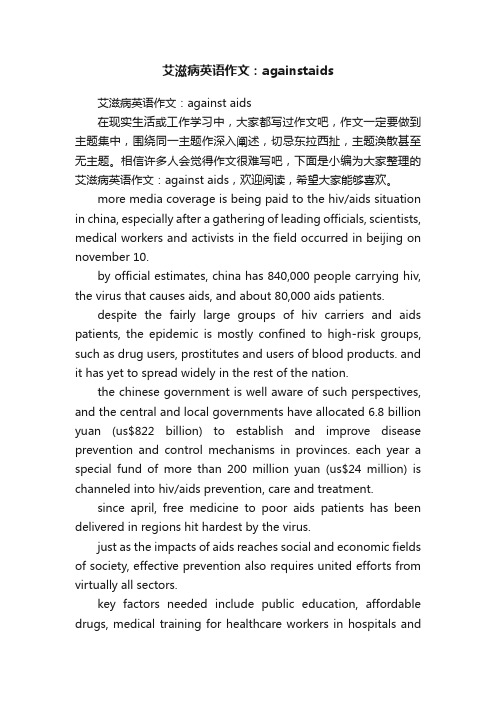
艾滋病英语作文:againstaids艾滋病英语作文:against aids在现实生活或工作学习中,大家都写过作文吧,作文一定要做到主题集中,围绕同一主题作深入阐述,切忌东拉西扯,主题涣散甚至无主题。
相信许多人会觉得作文很难写吧,下面是小编为大家整理的艾滋病英语作文:against aids,欢迎阅读,希望大家能够喜欢。
more media coverage is being paid to the hiv/aids situation in china, especially after a gathering of leading officials, scientists, medical workers and activists in the field occurred in beijing on november 10.by official estimates, china has 840,000 people carrying hiv, the virus that causes aids, and about 80,000 aids patients.despite the fairly large groups of hiv carriers and aids patients, the epidemic is mostly confined to high-risk groups, such as drug users, prostitutes and users of blood products. and it has yet to spread widely in the rest of the nation.the chinese government is well aware of such perspectives, and the central and local governments have allocated 6.8 billion yuan (us$822 billion) to establish and improve disease prevention and control mechanisms in provinces. each year a special fund of more than 200 million yuan (us$24 million) is channeled into hiv/aids prevention, care and treatment.since april, free medicine to poor aids patients has been delivered in regions hit hardest by the virus.just as the impacts of aids reaches social and economic fields of society, effective prevention also requires united efforts from virtually all sectors.key factors needed include public education, affordable drugs, medical training for healthcare workers in hospitals andthe public health system, monitoring and evaluation, care for orphans, measures to stop mother-to-child transmission, a comprehensive care framework and research into vaccines and a cure.none of these things can be achieved with the single hand of any institution — not health officials, not medical workers or the government.the fight against hiv/aids requires the participation of as many parties as possible.as former us president bill clinton said as a co-chair of the advisory board of international aids trust, the aids problem is “manageable and preventable” though we must wage it on all fronts with tenuous determination, utmost patience and tactful skills.。
英语作文关于艾滋病

英语作文关于艾滋病英文回答:HIV/AIDS is a global health crisis that has claimed the lives of millions of people worldwide. The virus that causes AIDS attacks the immune system, making it difficult for the body to fight off infections. While there is no cure for AIDS, there are treatments that can help people manage the virus and live longer, healthier lives.One of the biggest challenges in the fight against HIV/AIDS is stigma. People who are living with HIV/AIDS often face discrimination and social isolation. This stigma can make it difficult for people to get the care and support they need. It can also prevent people from getting tested for HIV, which can lead to late diagnosis and treatment.Another challenge in the fight against HIV/AIDS is the lack of access to treatment. In many developing countries,people who are living with HIV/AIDS cannot afford the medications they need to stay healthy. This lack of access to treatment can lead to AIDS-related illnesses and death.Despite the challenges, there has been significant progress in the fight against HIV/AIDS. In recent years, the number of people who are living with HIV/AIDS has declined, and the number of people who are dying from AIDS-related illnesses has also decreased. This progress is due to the development of new and more effective treatments, as well as increased access to care and support.There is still much work to be done in the fight against HIV/AIDS, but we have made significant progress in recent years. With continued research, education, and access to treatment, we can end the AIDS epidemic.中文回答:艾滋病是一种全球性的健康危机,已经夺去了全世界数百万人的生命。
艾滋病3000字英语作文-fight against AIDS
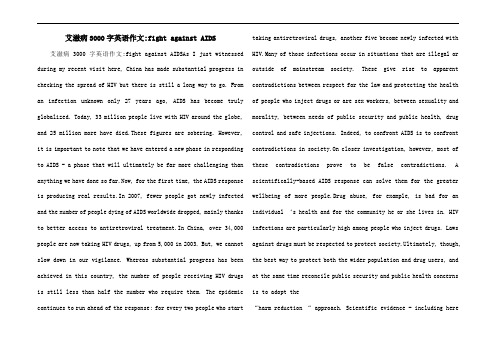
艾滋病3000字英语作文:fight against AIDS 艾滋病3000字英语作文:fight against AIDSAs I just witnessed during my recent visit here, China has made substantial progress in checking the spread of HIV but there is still a long way to go. From an infection unknown only 27 years ago, AIDS has become truly globalized. Today, 33 million people live with HIV around the globe, and 25 million more have died.These figures are sobering. However, it is important to note that we have entered a new phase in responding to AIDS - a phase that will ultimately be far more challenging than anything we have done so far.Now, for the first time, the AIDS response is producing real results.In 2007, fewer people got newly infected and the number of people dying of AIDS worldwide dropped, mainly thanks to better access to antiretroviral treatment.In China, over 34,000 people are now taking HIV drugs, up from 5,000 in 2003. But, we cannot slow down in our vigilance. Whereas substantial progress has been achieved in this country, the number of people receiving HIV drugs is still less than half the number who require them. The epidemic continues to run ahead of the response: for every two people who start taking antiretroviral drugs, another five become newly infected with HIV.Many of those infections occur in situations that are illegal or outside of mainstream society. These give rise to apparent contradictions between respect for the law and protecting the health of people who inject drugs or are sex workers, between sexuality and morality, between needs of public security and public health, drug control and safe injections. Indeed, to confront AIDS is to confront contradictions in society.On closer investigation, however, most of these contradictions prove to be false contradictions. A scientifically-based AIDS response can solve them for the greater wellbeing of more people.Drug abuse, for example, is bad for an individual ‘s health and for the community he or she lives in. HIV infections are particularly high among people who inject drugs. Laws against drugs must be respected to protect society.Ultimately, though, the best way to protect both the wider population and drug users, and at the same time reconcile public security and public health concerns is to adopt the“harm reduction “ approach. Scientific evidence - including herein China- shows that providing drug users with substitution therapy and clean needles reduces HIV transmission and supports enforcement of laws against drug abuse.Similarly, working with sex workers and their clients to encourage condom use reduces HIV among these groups and in society as a whole. When such programs are backed up by poverty reduction efforts to reduce women ‘s need to engage in prostitution, their impact is even greater.It is issues such as these that make AIDS such a complex problem to deal with. Complex problems require complex solutions. They also respond best to collective approaches. Working with community groups, for example, can greatly increase the impact - and effectiveness - of AIDS strategies. In fact, given that most infections are happening in situations outside the mainstream norm, it is often very difficult for government alone to reach those who need to be reached.It is encouraging, therefore, to note that there has recently been an increase in the number of community organizations working on AIDS in China. Many of these groups are doing incredible work.The Joint Assessment Report published last year by the government together with the United Nations System clearly highlights the need for greater involvement of community-based organization in the roll-out of programs to reach people with relevant services.Currently, there are no easy ways for community-based organizations to register. Without registration, there can be no bank account and thus no easy way to receive funding. Many of the groups I have seen are doing a great job - but their work is based on volunteerism. This is neither efficient nor sustainable.China has solid policies in place and has made significant progress in the fight against AIDS. It is time now to use the tremendous array of resources at its disposal to build on that progress, and to tackle new, tough challenges like harm reduction and increasing civil society involvement,As Chairman Mao said more than 60 years ago:“We must not b ecome complacent over our success. We should check our complacency and constantly criticize our shortcomings, just as we should wash our faces and sweep the floor every day to remove the dirt and keep them clean. “。
- 1、下载文档前请自行甄别文档内容的完整性,平台不提供额外的编辑、内容补充、找答案等附加服务。
- 2、"仅部分预览"的文档,不可在线预览部分如存在完整性等问题,可反馈申请退款(可完整预览的文档不适用该条件!)。
- 3、如文档侵犯您的权益,请联系客服反馈,我们会尽快为您处理(人工客服工作时间:9:00-18:30)。
艾滋病3000字英语作文:fight against AIDSAs I just witnessed during my recent visit here, China has made substantial progress in checking the spread of HIV but there is still a long way to go. From an infection unknown only 27 years ago, AIDS has become truly globalized. Today, 33 million people live with HIV around the globe, and 25 million more have died.These figures are sobering. However, it is important to note that we have entered a new phase in responding to AIDS - a phase that will ultimately be far more challenging than anything we have done so far.Now, for the first time, the AIDS response is producing real results.In 2007, fewer people got newly infected and the number of people dying of AIDS worldwide dropped, mainly thanks to better access to antiretroviral treatment.In China, over 34,000 people are now taking HIV drugs, up from 5,000 in 2003. But, we cannot slow down in our vigilance. Whereas substantial progress has been achieved in this country, the number of people receiving HIV drugs is still less than halfthe number who require them. The epidemic continues to run ahead of the response: for every two people who start taking antiretroviral drugs, another five become newly infected with HIV.Many of those infections occur in situations that are illegal or outside of mainstream society. These give rise to apparent contradictions between respect for the law and protecting the health of people who inject drugs or are sex workers, between sexuality and morality, between needs of public security and public health, drug control and safe injections. Indeed, to confront AIDS is to confront contradictions in society.On closer investigation, however, most of these contradictions prove to be false contradictions. A scientifically-based AIDS response can solve them for the greater wellbeing of more people.Drug abuse, for example, is bad for an individual's health and for the community he or she lives in. HIV infections are particularly high among people who inject drugs. Laws against drugs must be respected to protect society.Ultimately, though, the best way to protect both the wider population and drug users, and at the same time reconcile public security and public health concerns is to adopt the "harmreduction" approach. Scientific evidence - including here in China- shows that providing drug users with substitution therapy and clean needles reduces HIV transmission and supports enforcement of laws against drug abuse.Similarly, working with sex workers and their clients to encourage condom use reduces HIV among these groups and in society as a whole. When such programs are backed up by poverty reduction efforts to reduce women's need to engage in prostitution, their impact is even greater.It is issues such as these that make AIDS such a complex problem to deal with. Complex problems require complex solutions. They also respond best to collective approaches. Working with community groups, for example, can greatly increase the impact - and effectiveness - of AIDS strategies. In fact, given that most infections are happening in situations outside the mainstream norm, it is often very difficult for government alone to reach those who need to be reached.It is encouraging, therefore, to note that there has recently been an increase in the number of community organizations working on AIDS in China. Many of these groups are doing incredible work.The Joint Assessment Report published last year by thegovernment together with the United Nations System clearly highlights the need for greater involvement of community-based organization in the roll-out of programs to reach people with relevant services.Currently, there are no easy ways for community-based organizations to register. Without registration, there can be no bank account and thus no easy way to receive funding. Many of the groups I have seen are doing a great job - but their work is based on volunteerism. This is neither efficient nor sustainable.China has solid policies in place and has made significant progress in the fight against AIDS. It is time now to use the tremendous array of resources at its disposal to build on that progress, and to tackle new, tough challenges like harm reduction and increasing civil society involvement,As Chairman Mao said more than 60 years ago: "We must not become complacent over our success. We should check our complacency and constantly criticize our shortcomings, just as we should wash our faces and sweep the floor every day to remove the dirt and keep them clean."【艾滋病3000字英语作文:fight against AIDS】1.初二英语作文:Do Something to Fight against Pollution2.世界艾滋病日英语作文World AIDS Day3.英语作文艾滋病4.艾滋病的英语作文5.艾滋病英语作文:艾滋病的传播6.与艾滋病作战的英语作文7.关于艾滋病的作文8.艾滋病日作文。
